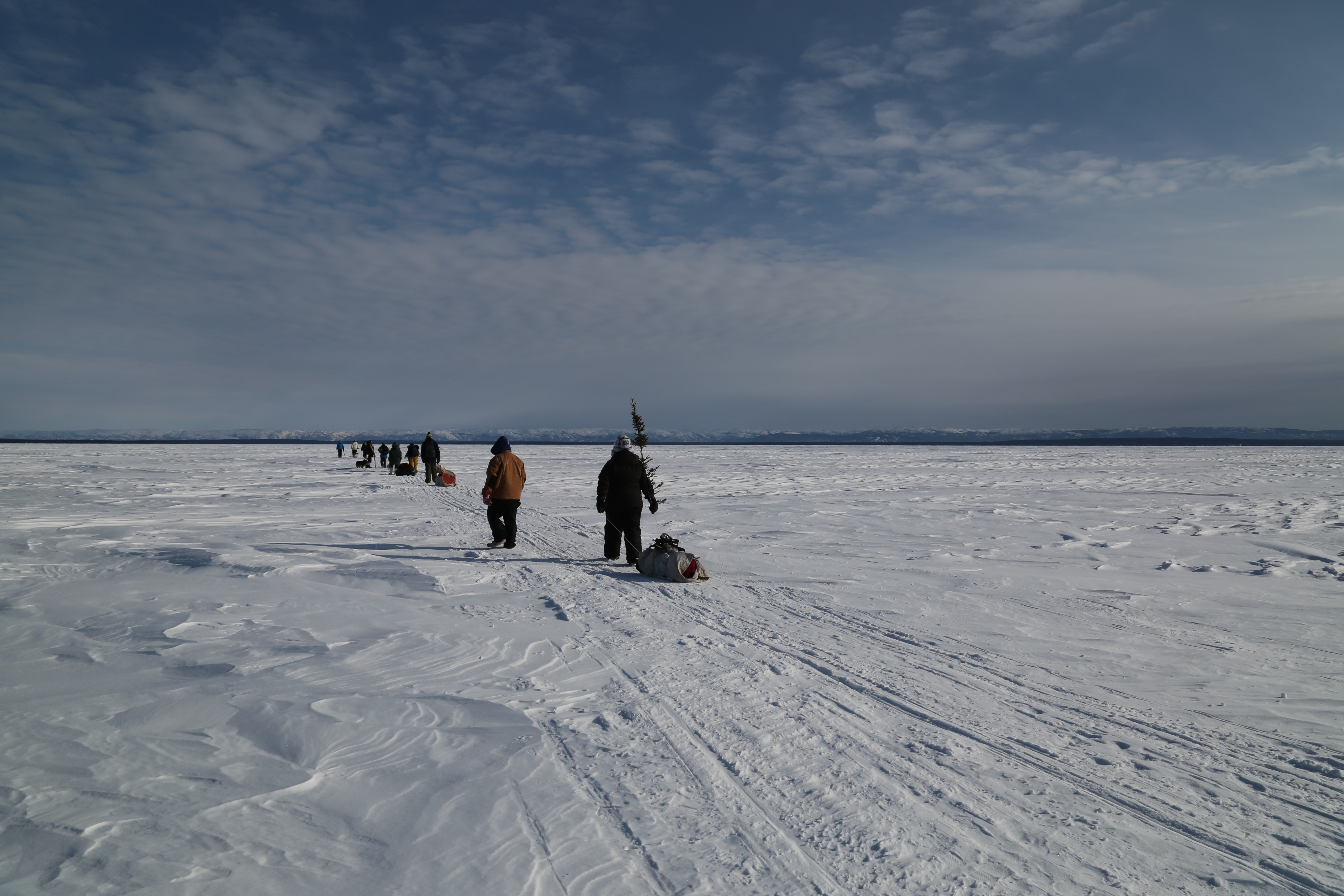I speak for the animals

A collection of dozens of notebooks and sheafs of papers filled with the handwriting of a well-known Labrador Innu elder has been translated from Innu-aimun to English in preparation for publication with the help of one of Memorial’s own.
Dr. Elizabeth Yeoman, a professor with the Faculty of Education, has partnered with elder, educator and environmental activist Elizabeth Penashue to write a book based on diaries that she has kept since the 1980s.
Dr. Yeoman first met Dr. Penashue 10 years ago when she interviewed her for a CBC Ideas radio documentary on walking. Of course, Dr. Penashue’s walks are famous. For more than 13 years, she has led annual spring snowshoe walks into the Mealy Mountains in Labrador as part of her lifelong commitment to protect the environment and animals of Labrador. It is important to her to live the traditional Innu lifestyle and to maintain a relationship with the land. Participants experience the health and happiness of life on the land and learn about Innu culture and environmental issues. After the death of Dr. Penashue’s husband, Francis, last fall, she said that the walk this past spring would be the last one. That walk was successfully completed in March of this year.
 After the 2004 interview, the two women stayed in touch. The following year, Dr. Yeoman joined her interview subject on the walk.
After the 2004 interview, the two women stayed in touch. The following year, Dr. Yeoman joined her interview subject on the walk.
“Being part of the walk helped me understand why Elizabeth is so passionate about life in the land and preserving Innu culture,” said Dr. Yeoman. “I experienced how unexpectedly cosy you can be in a tent at 30 below zero after a hard day’s work pulling a toboggan with all your possessions over snow and ice; the happiness of the children; the strong sense of community; the storytelling by candlelight at night; eating food we caught ourselves; the comforting knowledge of our inter-dependence and self-reliance; the laughter; the heightened awareness of the land, the animals, the sun, the wind, the stars.”
Dr. Penashue discussed her diaries with Dr. Yeoman during the walk. She wanted to translate them into English and put them into a book to share her stories with a wider audience, and subsequently sent them to Dr. Yeoman once she returned to St. John’s.
Upon reading the diaries, Dr. Yeoman came to understand more about Dr. Penashue. The story of her life is a fascinating one, starting with a traditional nomadic childhood in Kanekuanikat to a troubled existence in Sheshatshui, to her environmental activism and her quest for a healthy life for the young people of her community. Dr. Penashue would like her grandchildren and great-grandchildren to experience life as she knew it, in the country.
“Our culture is very, very important,” said Dr. Penashue. “White people don’t understand what Innu life a long time ago was like. They hear just a little bit of the story. Innu people who are in the country can see, can feel, can hunt and understand everything. My parents were happy in Nutshimit [a place where traditional Innu culture can be lived], and they passed that life to me, so now my grandchildren can have that strength again.”
The process to create the book, titled Nitashuitimuaut Ueshishit: I Speak for the Animals, has not been an easy one, says Dr. Yeoman. The first step was to translate the diaries into English; there are only a few people in the world who are able to read and write Sheshatshui Innu-aimun. Dr. Yeoman is currently learning the language. Some of the diaries were translated by Innu translators, including Dr. Penashue’s daughters Kanani Davis and Angela Rich. Dr. Penashue translated a number of them with editorial assistance from Dr. Yeoman and advice from family members. All of the diaries have now been translated into English. Graduate student Camille Fouillard is currently readying the manuscript for publication. Many publishers are interested in Dr. Penashue’s story; selecting one of them will be the next step.
Nitashuitimuaut Ueshishit: I Speak for the Animals will be published within the next couple of years.
Dr. Penashue’s teachings are widespread throughout the university. Dr. Yeoman shares the story with some of her education students as an example of research presented in personal and creative ways. Dr. Fiona Polack, associate professor with the Department of English, is editing a book titled Traces of Ochre: Changing Perspectives on the Beothuk. The book will include a chapter by Dr. Penashue and Dr. Yeoman about Dr. Penashue’s experience at the Boyd’s Cove archaeological site, her insights into remembering the Beothuk and the relationship between the Beothuk and the Innu. Dr. Marguerite MacKenzie has also worked with Dr. Penashue on materials developed through the Innu Language Project in the Department of Linguistics, which develops language and curriculum resources for Innu.
Dr. Penashue’s work has been recognized with a National Aboriginal Achievement Award and an honorary doctorate from Memorial University. She has also published stories in Them Days: Stories of Early Labrador, in several edited collections and in written and oral media pieces, including Labrador Life, The Labradorian and CBC Radio. The current book project has been funded by the J. R. Smallwood Foundation, the Newfoundland and Labrador Arts Council, Newfoundland and Labrador Intangible Cultural Heritage and the Social Sciences and Humanities Research Council.
“I hope that when I am gone, my grandchildren will continue my meshkanau [path] so they will not lose our culture,” she said. “A long time ago the people used their own abilities in hunting to get game and furs for trade. They used their own power. They were self-sufficient. When we share stories, we share our culture and give people the ability to look after their own needs again.”
For more information on Dr. Penshue’s walks, visit her blog at http://elizabethpenashue.blogspot.ca/.